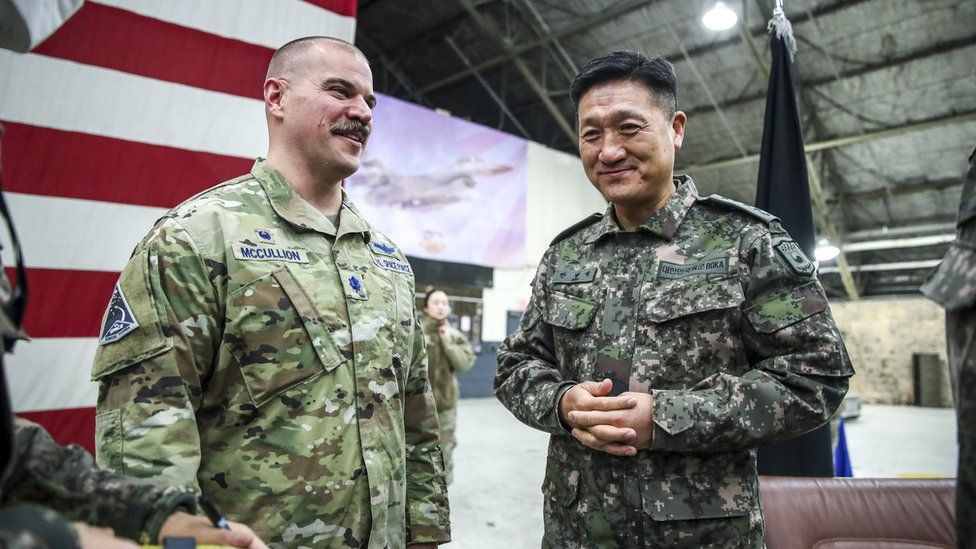ARTICLE AD BOX
 Image source, EPA
Image source, EPA
Lt Col Joshua McCullion (L), Commander of the US Space Forces Korea, talks with South Korean General Ahn Byung-seok, deputy commander of the South Korea-US Combined Forces Command, at Osan Air Base on Wednesday
The US Space Force has launched its first foreign command in South Korea on Wednesday.
Experts say the new unit will help the US monitor security threats from North Korea, Russia and China.
The facility is the first of its kind outside American soil since the creation of the US Space Force in 2019.
Its opening was marked in a ceremony at Osan Air Base, 40 miles (65 kilometres) south of Seoul, where the unit will be based.
During that ceremony, chief of the new space unit, Lt Col Joshua McCullion, hinted that North Korea is a focus for the command, saying that "an existential threat" exists just 48 miles north of the base.
He added that it is "a threat that we must be prepared to deter, defend against, and - if required - defeat."
The US Space Force - the newest branch of the US military in more than 70 years - was launched three years ago as a way to protect American assets in space, including hundreds of satellites used for communication and surveillance.
But why has it chosen South Korea as its first foreign unit?
Andrew Yeo, senior fellow and Korea Chair at the Washington, DC-based think tank Brookings Institute, said the decision is likely fuelled by two reasons.
One is the growing concern over North Korea, which has launched a record number of ballistic missiles in 2022.
The second reason, he said, is that the militaries of South Korea and the US already have strong ties through their Combined Forces Command, which has been in place for 44 years with a mission of maintaining stability in Northeast Asia.
"It's easier [for the US] to get cooperation from South Korea to set something up militarily, because there is already an alliance structure," Mr Yeo said.
Mr Yeo said the Space Force will likely be utilised to track missile activity in the region, as well as tap into satellite technology to monitor other movements in the area.
When launching the Space Force in 2019, then-US president Donald Trump described space as "the world's newest war-fighting domain".
"The Space Force will help us deter aggression and control the ultimate high ground," Mr Trump said.
Other countries have also established similar military branches aimed at defending space, namely the UK, France and Australia. South Korea's air force has also set up its own space unit this month.
The US Space Force - whose emblem closely resembles that of Star Trek and whose members are called "guardians" - was the subject of some satire shortly after its launch.
But at Wednesday's ceremony, General Paul LaCamera, commander of US troops in South Korea, said the Space Force is a key addition to the military's existing capabilities on land, sea and air.
The Space Force, he said, "has helped ensure the United States is posited to deter aggression and outpace potential adversaries in the face of changing threats in the space environment and growing threats elsewhere."
Mr Yeo said that despite scepticism from some, the Space Force has grown since the Trump administration, and the establishment of a new unit in South Korea shows that there is interest in moving its mission forward.
He added the new unit will also help the US address other threats in the region outside of North Korea, like anti-satellite capabilities that have been developed by China and Russia.
Since the creation of the Space Force, US officials have expressed concern about Russia's and China's activities in space.
This includes what US vice-president Kamala Harris had called an "irresponsible" test by Russia in 2021 that endangered the International Space Station, prompting a new strategy by the Biden administration for responsible use of space.
China's development of hypersonic weapons, which could travel more than five times the speed of sounds, has also fuelled an aerial arms race between the US and China.

 2 years ago
45
2 years ago
45








 English (US) ·
English (US) ·